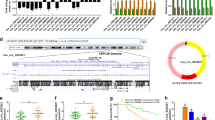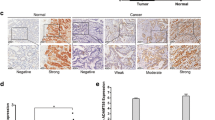Abstract
Cyclin-dependent kinase 12 (CDK12) has been found to regulate tumor progression. However, its function in gastric carcinoma (GC) remains controversial. This work aimed to explore the exact effect of CDK12 on GC progression. We detected the expression of CDK12 in GC cells and normal gastric mucosal epithelial cells. Then CDK12 function on GC cell proliferation, migration, and angiogenesis was researched by colony formation experiment, Transwell experiment, and angiogenesis assay. Moreover, CDK12 effect on the PI3K/AKT/mTOR pathway activity was explored by western blot. Further, we used LY294002 (10 μM) to treat GC cells to verify whether CDK12 regulates GC progression by activating the PI3K/AKT/mTOR pathway. Additionally, CDK12 effect on the expression of prognostic factors of GC was detected by western blot, including alkaline phosphatase (ALP) and Ki67. Quantitative real-time polymerase chain reaction and western blot were utilized to evaluate the expression of mRNAs and proteins. As a result, CDK12 was upregulated in GC cells. CDK12 overexpression facilitated the proliferation, migration, and angiogenesis of GC cells. However, CDK12 silencing showed an opposite result. CDK12 overexpression activated the PI3K/AKT/mTOR pathway, but CDK12 silencing inactivated it in GC cells. The blockage of the PI3K/AKT/mTOR pathway induced by LY294002 treatment counteracted the promotion of CDK12 on the proliferation, migration, and angiogenesis of GC. Further, CDK12 silencing suppressed the expression of ALP and Ki67 proteins in GC cells. Taken together, CDK12 promotes the proliferation, migration, and angiogenesis of GC by activating the PI3K/AKT/mTOR pathway. It may be a novel target for GC treatment.





Similar content being viewed by others
Data Availability
Data will be available on reasonable request.
References
Morinishi, T., et al. (2022). Peroxisome proliferator-activated receptor-α expression is associated with histological type in human gastric carcinoma. Mol Clin Oncol, 16(2), 51.
Joshi, S. S., & Badgwell, B. D. (2021). Current treatment and recent progress in gastric cancer., 71(3), 264–279.
Xie, Q., et al. (2022). Apatinib inhibits paclitaxel resistance of gastric carcinoma cells through VEGFR2 pathway. Am J Transl Res, 14(1), 421–431.
Nai, A., et al. (2021). lncRNA/miR-29c-mediated high expression of LOX can influence the immune status and chemosensitivity and can forecast the poor prognosis of gastric cancer. Front Cell Dev Biol, 9, 760470.
Ma, H.F. and P. Shu, (2022) Identification of miR 4510 as a metastasis suppressor of gastric cancer through regulation of tumor microenvironment via targeting GPC3 39 2 363-374
Choi, H.J., et al., (2019) CDK12 drives breast tumor initiation and trastuzumab resistance via WNT and IRS1-ErbB-PI3K signaling 20 10 e48058
Quereda, V., et al. (2019). Therapeutic targeting of CDK12/CDK13 in triple-negative breast cancer. Cancer Cell, 36(5), 545-558.e7.
Emadi, F., et al. (2020). CDK12: A potential therapeutic target in cancer. Drug Discovery Today, 25(12), 2257–2267.
Li, Q., et al. (2020). DDX11-AS1exacerbates bladder cancer progression by enhancing CDK6 expression via suppressing miR-499b-5p. Biomedicine & Pharmacotherapy, 127, 110164.
Ji, J., et al. (2019). Expression pattern of CDK12 protein in gastric cancer and its positive correlation with CD8(+) cell density and CCL12 expression. International Journal of Medical Sciences, 16(8), 1142–1148.
Baghery Saghchy Khorasani, A., et al., (2021) The PI3K/Akt/mTOR signaling pathway in gastric cancer from oncogenic variations to the possibilities for pharmacologic interventions Eur J Pharmacol 898 173983
Rong, L., et al. (2020). Salidroside induces apoptosis and protective autophagy in human gastric cancer AGS cells through the PI3K/Akt/mTOR pathway. Biomedicine & Pharmacotherapy, 122, 109726.
Tian, L., et al. (2018). MiR-361-5p suppresses chemoresistance of gastric cancer cells by targeting FOXM1 via the PI3K/Akt/mTOR pathway. Oncotarget, 9(4), 4886–4896.
Lei, T., et al. (2018). Cyclin K regulates prereplicative complex assembly to promote mammalian cell proliferation., 9(1), 1876.
Li, Y., et al. (2016). Identification and characterization of the cyclin-dependent kinases gene family in silkworm. Bombyx mori. DNA Cell Biol, 35(1), 13–23.
Liang, Y., et al., (2021) JWA suppresses proliferation in trastuzumab-resistant breast cancer by downregulating CDK12 7 1 306
Wang, C., et al., (2020) CDK12 inhibition mediates DNA damage and is synergistic with sorafenib treatment in hepatocellular carcinoma 69 4 727–736
Yang, B. and J. Chen, 2021 CDK12 promotes cervical cancer progression through enhancing macrophage infiltration 6645885
Wang, B., et al. (2021). Comprehensive analysis of metastatic gastric cancer tumour cells using single-cell RNA-seq. Science and Reports, 11(1), 1141.
Bai, N., et al. (2020). CDK12 promotes papillary thyroid cancer progression through regulating the c-myc/β-catenin pathway. Journal of Cancer, 11(15), 4308–4315.
Peng, F., et al. (2020). CDK12 promotes breast cancer progression and maintains stemness by activating c-myc/β-catenin signaling. Current Cancer Drug Targets, 20(2), 156–165.
Giuppi, M. and A. La Salvia, (2021) The role and expression of angiogenesis-related miRNAs in gastric cancer 10 2
Matsuoka, T., & Yashiro, M. (2014). The role of PI3K/Akt/mTOR signaling in gastric carcinoma. Cancers (Basel), 6(3), 1441–1463.
Fattahi, S., et al. (2020). PI3K/AKT/mTOR signaling in gastric cancer: Epigenetics and beyond. Life Sciences, 262, 118513.
Karar, J., & Maity, A. (2011). PI3K/AKT/mTOR pathway in angiogenesis. Frontiers in Molecular Neuroscience, 4, 51.
Zhang, J., et al. (2021). Nucleoporin 37 promotes the cell proliferation, migration, and invasion of gastric cancer through activating the PI3K/AKT/mTOR signaling pathway. In Vitro Cellular and Developmental Biology. Animal, 57(10), 987–997.
Li, H., et al. (2021). CDK12 inhibition enhances sensitivity of HER2+ breast cancers to HER2-tyrosine kinase inhibitor via suppressing PI3K/AKT. European Journal of Cancer, 145, 92–108.
Wang, Y., et al. (2021). Decreased albumin-to-alkaline phosphatase ratio predicted poor survival of resectable gastric cancer patients. J Gastrointest Oncol, 12(4), 1338–1350.
Li, Y., et al. (2020). Use of the alkaline phosphatase to prealbumin ratio as an independent predictive factor for the prognosis of gastric cancer. World Journal of Gastroenterology, 26(44), 6963–6978.
Li, L. T., et al. (2015). Ki67 is a promising molecular target in the diagnosis of cancer (review). Molecular Medicine Reports, 11(3), 1566–1572.
Seo, S. H., et al. (2019). Ki-67 labeling index as a prognostic marker in advanced stomach cancer. Ann Surg Treat Res, 96(1), 27–33.
Funding
This work was supported by the National Cancer Center Climbing Fund (NCC201801B002).
Author information
Authors and Affiliations
Contributions
All authors contributed to the study conception and design. Material preparation, data collection, and analysis were performed by Jun-lin Chen, Xue-lin Zhang, Man-man Zhang, Su-ling Wang, and Chen Zhao. The first draft of the manuscript was written by Li-zhen Gao and Jun-qing Wang and all authors commented on previous versions of the manuscript. All authors read and approved the final manuscript.
Corresponding authors
Ethics declarations
Ethics Approval
N/A.
Consent to Participate
N/A.
Consent for Publication
N/A.
Competing Interests
The authors declare no competing interests.
Additional information
Publisher's Note
Springer Nature remains neutral with regard to jurisdictional claims in published maps and institutional affiliations.
Li-zhen Gao and Jun-qing Wang contributed equally to this study.
Supplementary Information
Below is the link to the electronic supplementary material.
Rights and permissions
Springer Nature or its licensor (e.g. a society or other partner) holds exclusive rights to this article under a publishing agreement with the author(s) or other rightsholder(s); author self-archiving of the accepted manuscript version of this article is solely governed by the terms of such publishing agreement and applicable law.
About this article
Cite this article
Gao, Lz., Wang, Jq., Chen, Jl. et al. CDK12 Promotes the Proliferation, Migration, and Angiogenesis of Gastric Carcinoma via Activating the PI3K/AKT/mTOR Signaling Pathway. Appl Biochem Biotechnol 195, 6913–6926 (2023). https://doi.org/10.1007/s12010-023-04436-7
Accepted:
Published:
Issue Date:
DOI: https://doi.org/10.1007/s12010-023-04436-7




